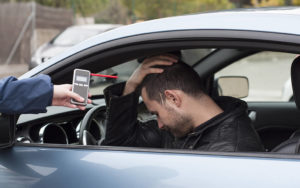Should you refuse a breathalyzer test?
Posted July 28th, 2015 by Anthony Carbone, PC.
Categories: Criminal Defense.
 You made the determination to get behind the wheel after just a few drinks. After all, you felt fine and certainly were capable of driving the car a few blocks. Suddenly, a police officer signals you to pull your vehicle to the side of the road. What now? Should you refuse a breathalyzer test?
You made the determination to get behind the wheel after just a few drinks. After all, you felt fine and certainly were capable of driving the car a few blocks. Suddenly, a police officer signals you to pull your vehicle to the side of the road. What now? Should you refuse a breathalyzer test?
Requirements for Breathalyzer Tests
Under New Jersey law, vehicle drivers are expected to take a breathalyzer test if they are arrested for suspicion of driving while under the influence (DUI). According to New Jersey’s Motor Vehicle Commission, consent for breathalyzer tests is tied in to the initial acquisition of a New Jersey operator’s license. Drivers give implied consent for the test after they are successfully issued driving privileges. Implied consent law specifically states that motor vehicle operators are “….deemed to have given consent to the taking of samples of his breath for the purpose of making chemical tests to determine the content of alcohol in his blood.”
Breathalyzer Test Procedures
New Jersey police officers who request breathalyzer tests are required to follow certain procedures. They include the following:
- The request must come because the officer had reasonable grounds to suspect that the vehicle operator was driving under the influence.
- The sample must be properly recorded and made available to the tested individual.
- The accused should be permitted to allow an expert of their choice take samples for evaluation.
Proving Breathalyzer Refusal
There are penalties associated with refusing a breathalyzer test. In order to prove that a defendant refused the breathalyzer, the prosecution must show the following:
- The police had probable cause to believe the driver was under the influence;
- The motor vehicle was operated on either a public or quasi-public roadway;
- The defendant was arrested on suspension of driving under the influence;
- The police requested that the suspect submit to a breathalyzer test;
- There is evidence that the defendant refused the test;
- The defendant was advised of implied consent law and still refused the test.
Consequences for Refusing Breathalyzer Tests
For whatever reason, you may decide to refuse a breathalyzer test. What are the consequences? The penalties can involve license revocation for up to one year. In addition, if the charges involve a second offense, one could conceivably lose their driver’s privileges for two years. Multiple offenses are treated even more harshly. Significant fines are also assessed for refusing to submit to breathalyzer tests.
If the police officer has reason to arrest you for DUI, chances are you will also be charged with refusal to take the breathalyzer test. This represents two separate offenses. At the Law Offices of Anthony Carbone, we are familiar with both charges. Contact our office to learn your legal rights.


